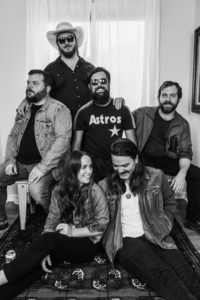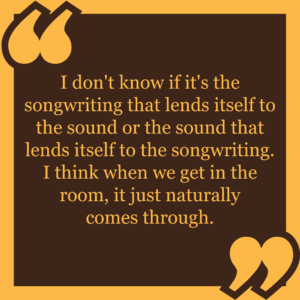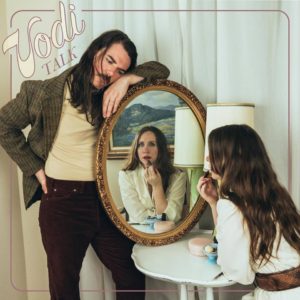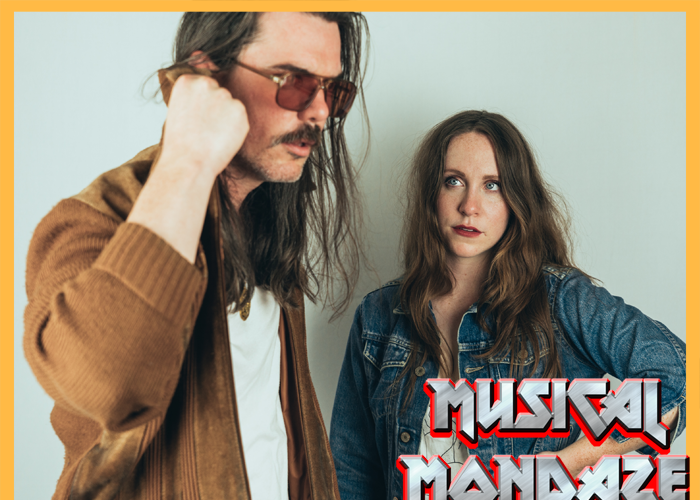 Some artists grow on you, building on the repetitive play of their songs until you can’t help but fall in love with their music. Other artists hook you instantly, capturing you with their sound so that upon first listen, you say to yourself, “Where has this music been all of my life?”
Some artists grow on you, building on the repetitive play of their songs until you can’t help but fall in love with their music. Other artists hook you instantly, capturing you with their sound so that upon first listen, you say to yourself, “Where has this music been all of my life?”
Texas-based Vodi falls into the latter category.
Spearheaded by the beautifully calming vocals of Tom Lynch, the indie rock band’s debut album “Talk” is both a nostalgic throwback and a modern revelation. What you’re hearing streaming from your speakers isn’t just a collection of songs, but a gourmet dinner prepared with only the finest ingredients. “Talk” takes you on a 1970s-style singer/songwriter journey – a time in the history of music when song placement was just as important as the songs themselves and each track was considered for its transition into the next.
We recently sat down with Lynch to discuss Vodi’s evolution, how he worked to make his vocals a part of the instrumentation, and where he gets the most enjoyment out of being in the band.
TrunkSpace: In terms of the Vodi sound, what has that evolution looked like? The band is so unique, a sort of musical mix of both the past and present, and we’re curious how that marriage came to be?
Lynch: I’m not really sure. We basically try to write music that we like, obviously, like everybody does. We all love the old 80s, 70s sounds and I think it just comes through. I don’t know if it’s the songwriting that lends itself to the sound or the sound that lends itself to the songwriting. I think when we get in the room, it just naturally comes through.
TrunkSpace: Had we been in the room with you guys when you first started down the Vodi path, would what we hear then match what we hear now on “Talk?”
Lynch: No, man. When we first started, it was actually just the drummer and I… a then his brother was playing bass. We would go into a studio and write a song on the spot. I had done projects before and hadn’t done one in a while and I was bored. I wanted to start something new that was less Americana or rootsy, and more something I would enjoy playing live and loud and have a lot of fun doing it. We got into a room and started writing the songs and they looked completely different. As we developed a sound, the songwriting changed with it. Of course, my wife, Haley, who’s in the band too, came in.
We had some really crappy demos. (Laughter) We didn’t really know each other at the time, so I was like, “I really want to have this girl come sing on my stuff.” I thought, “Well, it’s pretty crappy but it’s worth a shot.” She came in and she ended up loving it. Honestly, that’s when the band really started, when we got me, the drummer, and Haley together and then moved on from there.
this girl come sing on my stuff.” I thought, “Well, it’s pretty crappy but it’s worth a shot.” She came in and she ended up loving it. Honestly, that’s when the band really started, when we got me, the drummer, and Haley together and then moved on from there.
TrunkSpace: Was it one of those things where it just clicked and it all made sense?
Lynch: Totally. We had different players coming in and out of the band. When we first started, we were just kind of a hodgepodge of stuff going on. The songs sounded like I was still writing for an Americana group. It was very out of order. But then, the more we played, the better the writing got, the better the vibe got. And then people fell into place. It wasn’t like a super, well-orchestrated plan. It was more like, this is what worked best and it just kind of clicked.
TrunkSpace: As you were working to steer yourself away from an Americana sound, did you find that you had to rediscover your own singing voice?
Lynch: Yeah. Totally. Man, that was actually one of the harder transitions for me. The stuff I wrote before, I sang soft and light. I wanted to sing heavier, or at least sing in a different way than I had before. It took a little while to get used to singing in a band where I played an electric and did the lead lines, as opposed to playing an acoustic and just signing along, or signing background harmonies.
TrunkSpace: How do you view yourself as a vocalist now?
Lynch: I don’t really know how to explain it. With Americana, I always felt like I was singing a story. With this, I feel like I’m singing a feeling. Does that make sense?
TrunkSpace: Absolutely. When we first heard the album, it felt like your voice was one of the instruments.
Lynch: Man, I’m glad you said that, because one of the first things I talked about with our engineer, our producer Steve Christensen, was that I wanted to make the vocals part of the instrumentation.
TrunkSpace: Then your mission was a success. Everything is very tight and flows together.
Lynch: That has a lot to do with how good the guys around me are. Those guys are really, really good. There are a lot of times where I feel like, instrumentally, I’m the weak link in the band.
I don’t know if you’ve listened to Hayley’s stuff, but she’s got an amazing voice. She’s got her own band, Dollie Barnes. They put a record out earlier this year. They finished it up just as we were meeting. I was blown away with how good she is.
 TrunkSpace: Your songwriting stretches back beyond your time with Vodi. Did you try to capture anything you wrote before the band came together and turn it into material for this album?
TrunkSpace: Your songwriting stretches back beyond your time with Vodi. Did you try to capture anything you wrote before the band came together and turn it into material for this album?
Lynch: We tried that, because I’ve got 15 to 20 songs sitting, that I’ve never used. I was going to do another solo record and once I started this I abandoned it. Then we went back and tried to figure out if any of them worked. Again, it was more storytelling songs as opposed to the feeling we were going for with Vodi. It just didn’t work.
We’re already writing for the next record. Some of those songs, I’m still going back to rehash. Some of them are great, but it’s really difficult to turn what I was into then into what we are now.
TrunkSpace: So from a lyrical standpoint, you must have had to take a different perspective as well to distance yourself from that storyteller’s point of view. Did that force you to change up your songwriting process at all?
Lynch: A little bit, but it was more fun. I had been songwriting for so long, it was something that I’d grown accustomed to. I think the hardest part was breaking out of the cycle of that type of songwriting, because I would usually approach it from an acoustic guitar. When I first started writing for this, I told myself I could never touch an acoustic guitar to write. I’d either use a piano, or a bass, or even sit down at the drums, or whatever. It lent itself better to me coming up with melodies, and feelings, and beats that would fit what we were doing. Sometimes, when you strum the acoustic guitar, for me at least, I can’t imagine too much else going on.
TrunkSpace: You mentioned that the band is already writing material for the next album. As you look towards the future, creatively, what are your goals with Vodi?
Lynch: We want to put out music for people to hear, but for me, personally, my favorite thing to do is to get into a studio. I absolutely love getting in, getting the bones of a song down and building a song out, sifting through all of the sprinkles that you put on top of stuff. It’s probably my favorite process in the entire music thing.
“Talk” is available now here.
Check out Vodi’s new Christmas single, “This Is The Best Christmas,” below.


